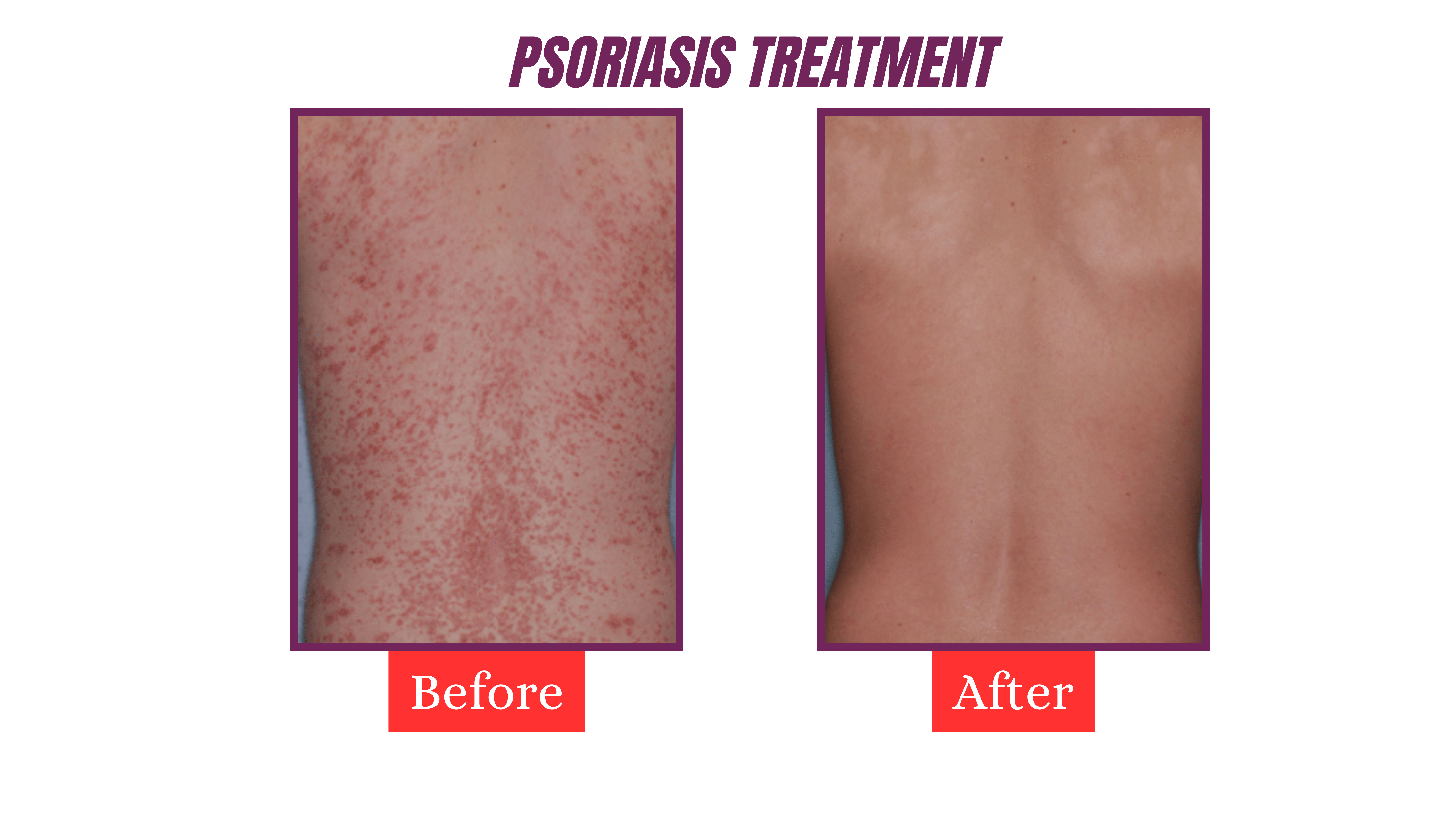Psoriasis
Avoiding complex health issues such as allergy need to be identified during the early stages in order to experience the optimum results. Allergens and pollens cause major problems due to which proper health benefits are not realized.
Psoriasis is a skin condition characterized by an overproduction of skin cells, leading to flaky, premature skin shedding. This results in red and white patches that cause significant discomfort for sufferers. If left untreated, psoriasis can lead to more severe complications, affecting the overall well-being of an individual.
It is crucial to seek timely medical care from an experienced dermatologist to prevent the condition from worsening and ensure effective treatment. Early intervention can help manage the symptoms and improve quality of life.
Symptoms:
- Bleeding in congested skin areas
- Mild scales on the skin
- Plaques appearing randomly on the scalp
Taking proactive care of psoriasis, especially in the early stages, is crucial to avoid complications. Timely and precise treatment can help in managing the condition effectively and improving overall skin health.
Effective Treatments:
- Psoriasis Ointments and Creams: Specialized creams and ointments designed to soothe and treat psoriasis symptoms.
- UV Treatment with Sunlight Protection: Controlled exposure to ultraviolet light can help reduce inflammation and slow the overproduction of skin cells. It’s important to use sunscreen for protection during this therapy.
- OTC Medication with Corticosteroids: Over-the-counter corticosteroid creams can help reduce inflammation and calm flare-ups.
- Anthralin: A topical treatment that can help reduce inflammation and slow skin cell turnover, offering relief from psoriasis symptoms.
Seeking treatment from a seasoned dermatologist ensures the most effective care, addressing the random patches that may appear on different parts of the body. Proper skincare and regular treatment will greatly help in managing the condition without major complications.
Untreated psoriasis can lead to severe health complications affecting the entire body. Recognizing the best treatment options early is essential to avoid these risks and ensure maximum comfort.
Potential Effects of Untreated Psoriasis:
- Cancerous Health Conditions: Psoriasis has been linked to an increased risk of certain cancers.
- Heart Attack Risks: Psoriasis can contribute to cardiovascular issues, increasing the risk of heart attacks.
- Diabetes: Chronic inflammation from untreated psoriasis may lead to insulin resistance and other metabolic issues.
Causes of Psoriasis:
- Immune System Reactions: Psoriasis is primarily an autoimmune disorder, where the immune system attacks healthy skin cells.
- Skin Flaking: Rapid skin cell turnover leads to flaking, causing discomfort and exacerbating the condition.
- Genetic Factors: Family history and genetic predisposition play a significant role in the development of psoriasis, leading to inflammation and flare-ups.
Timely access to advanced treatments, such as Vitamin D supplements and other prescribed medications, can help manage psoriasis and prevent serious complications. Consulting with healthcare specialists ensures that the condition is effectively managed, minimizing long-term health risks.
What is psoriasis skin disorder?
Psoriasis is a chronic autoimmune skin illness characterised by excessive skin cell proliferation, resulting in the creation of red, scaly patches or plaques on the skin.
Who gets psoriasis? Is it spreadable?
Psoriasis can affect everyone. Psoriasis affects men, women, children, and people of all races. No, psoriasis does not spread. It is an autoimmune condition that cannot be passed on through contact with affected people. The condition may run in families.
Is psoriasis curable?
Psoriasis does not have a cure. However, good treatment can regulate the condition so that it does not bother you as much.
When should I see the doctor?
Conduct regular skin self-examinations to detect any changes in your skin. Contact your healthcare practitioner if you notice changes in your skin, a rash that does not go away, or a rash that worsens.
How can I prevent psoriasis?
You may reduce the risk by following your doctor's treatment, living a healthy lifestyle, taking care of your skin, and avoiding triggers that can cause a recurrence of symptoms.
What is the treatment for psoriasis?
Topical creams, phototherapy (light therapy), oral medicines, and biologics are among the treatment options. The treatment chosen is determined by the severity of the ailment and the areas affected.
Where can psoriasis appear on the body?
Psoriasis can appear anywhere on the body, including the scalp, elbows, knees, hands, feet, and genitals.
What worsens psoriasis?
Stress and infections are two factors that might aggravate psoriasis. Some medications can also make it worse. These medicines include lithium, and certain high-blood pressure medicines such as beta blockers and angiotensin-converting enzyme inhibitors, as well as pain relievers such as nonsteroidal anti-inflammatory drugs (such as ibuprofen).
Is psoriasis and eczema same?
Psoriasis and eczema are two distinct skin diseases. Both conditions produce symptoms such as discoloured skin, a rash, and itching. Psoriasis plaques are patches of thick, scale-covered skin. Eczema is characterized by a rash of dry, rough skin. Eczema is also associated with more severe itching than psoriasis.
What are the signs and symptoms of psoriasis?
In addition to skin plaques or a rash, you may experience the following symptoms:
- Itchy Skin
- Cracked & Dry Skin
- Skin Irritation
- Pitted, Cracked, or Crumbly Nails.
- Joint Pain.
If you scratch your debris, you could break open your skin, leading to an infection. You might have infections if you experience extreme pain, swelling, and a fever. If you get any of these symptoms, get in touch with your doctor.
Results

